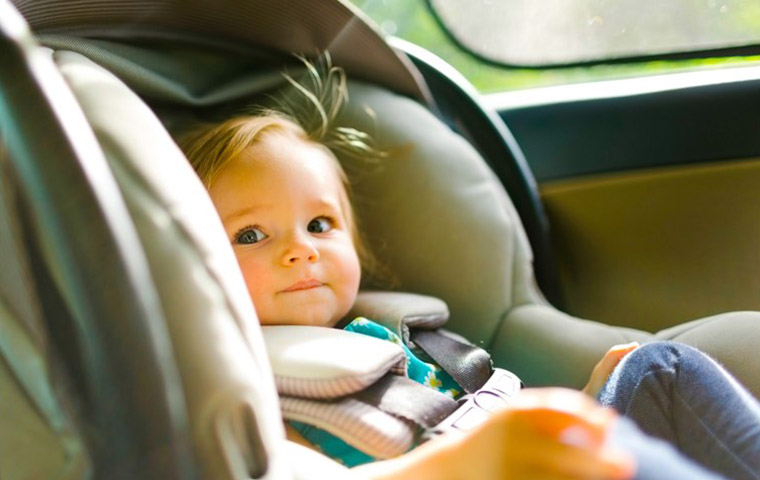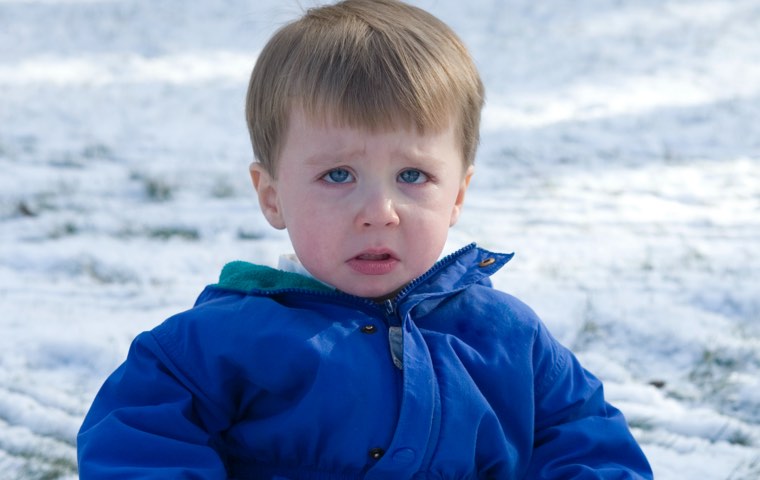My preschooler doesn't mind me!
I've told him a hundred times not to jump off the bed!
She was looking right at me when she drew on the wall with her markers.
Why does he run and yell in the house? He knows I don't allow that behavior!
When you hear the word "discipline," you might immediately think about punishment and misbehavior. But discipline is so much more than that. Children grow by exploring and experimenting with their world, but they depend on you to keep them safe and teach them about proper behavior. You can help them by setting boundaries and giving them consequences when they misbehave.
As every parent knows, there's no one-size-fits-all solution for disciplining children, but there is an approach that can give you effective strategies for dealing with misbehavior. It is called positive discipline, and it can help your kids make the right choices, even when you're not around.
What is Positive Discipline?
Positive discipline is one aspect of positive parenting. It focuses on what you want your child to do rather than on telling him what he can't do. However, it's important to consider his age and level of development. For example, a two- or three-year-old needs a concrete example of what to do. It may be more effective to take his hand and help him put his toys up properly. A four-year-old may respond better to your words reminding him where the toys go.
Positive discipline begins with understanding how to handle the immediate problem and determining the goal. The immediate problem may be stopping your child from running and yelling in the house, but the goal is to instill positive behaviors long-term. Instead of saying, "Stop running and yelling!" try saying, "Walk please, and use your indoor voice." A preschooler needs plenty of reminders and reinforcements about what he is supposed to do.
We have some tips and tools to help you through those difficult moments, which will help your child become more independent and able to control his behavior.
Need parenting help now?
The Texas Parent Helpline is available 24/7.
- Call 833-680-0611
- Chat with us
- Text 833-680-0611

Does Physical Discipline Work?
Physical discipline isn't the answer. It might stop the misbehavior today, but studies show it does not teach correct behavior in the long run. The misbehavior is likely to repeat because the child hasn't learned what he is supposed to do. Physical discipline like spanking can teach a child it's okay to hit someone when you are upset or angry.
Spanking is less common than it used to be. Most parents probably understand the temptation to spank their child at some point to stop him from doing something unsafe, quickly stop an annoying behavior, or get his attention when nothing else seems to work. Even in such difficult situations, positive discipline offers a more effective option.
Research shows that punishing misbehavior does not teach good behavior or prevent future misbehavior. It's more effective to give the child a brief timeout or take away a privilege. The most important thing parents can do is to reinforce the positive behavior they want to see.
4 Strategies for Using Positive Discipline
The core of positive parenting is to model the behavior you want to see in your children. Here are some positive parenting tips to use with your preschooler. Remember, you'll get better with practice, just as your child will.
Start with a positive attitude.
Think of yourself as a positive parenting coach rather than a rule enforcer. Your child learns from everything you say and do, including how you respond to stressful moments. Here are some ways to teach positive lessons:
-
Stay calm and speak in a conversational voice.
This will communicate that you are in control and able to handle the situation. A calm demeanor can be contagious and help lower your child's level of agitation. Yelling or lecturing communicates that you are upset, which can make your child more upset. It can also make your child feel guilty or ashamed about himself rather than pointing him toward good behavior.
-
Give clear, positive instructions.
Sometimes children misbehave because they don't know what is expected. "Get ready for dinner," may seem like a clear instruction, but your child may not understand all the steps that are required. Preschoolers can generally follow instructions with two steps at a time. Try telling your child, "Dinner is almost ready. Please put your toy up now and go wash your hands." After that, "Come to the table and sit in your chair."
-
Praise good behavior.
Look for opportunities to provide specific, positive feedback about your child's behavior. "Thank you for playing with the baby so I could finish folding the laundry. It made us both happy. I appreciate you being a helper." Giving detailed reinforcement on the spot helps your child take pride in his good behavior. When he slips up, you can remind him about the right way to handle a situation.
-
Keep a sense of humor.
Rather than criticize a child's misbehavior, try a bit of laughter: "Here comes the tickle monster to get children who don't listen!" Lots of parents have adopted simple phrases to help children remember what to do in certain situations, such as "stop, look, and listen" before crossing the street.
Handling Kids Who Won't Mind
Your attitude is the most important tool you have in handling misbehavior. How you approach a situation can determine whether it turns into a battle of wills or a time where your child can explore and develop within safe boundaries. Positive parenting techniques help you keep a good attitude even in challenging situations.
Take positive actions.
Young children need the supervision, distraction, and redirection that positive parenting provides. What you do can make a great impression on a preschooler.
-
Show children what to do rather than tell them.
For example, demonstrate that toys go back in the toy box rather than behind the sofa. "We put toys back in the toy box so we will know where they are when we are ready to play with them later."
-
Give your child choices.
Children need to practice making good decisions. You can help by giving simple choices, such as "Do you want to put on your shirt or your socks first?" and progressing to more complicated options such as, "We don't have time to play another game. Do you want to put the game up now, or leave it here so you can play after we eat?" Another way to help is to let older children make some decisions. Ask, "What should we make for lunch today?" and let him participate in the decision-making.
-
Know when to ask.
Ask a child a question only if you want to know the answer! "Are you ready for bed?" is almost sure to get a "No." Instead, be clear about what's next and tell him what to do. "It's time for bed. We need to go put on your pajamas and brush your teeth." Let your actions do the talking as you guide him to get ready for bed. Remain calm and focused on the task at hand even if he dawdles or gets distracted. Using positive discipline, redirect him to what he needs to do rather than criticizing him.
Be kind - over and over.
-
Model politeness.
Using "please" and "thank you" when talking to your child is the first step in modeling polite behavior. Listen when he talks to you. Get on his level and make eye contact when you talk to him. Don't interrupt him with an immediate request but give him some warning. "We are going to leave in two minutes. That gives you time to go down the slide three more times. Let's count together." Positive parenting techniques help you model using respectful language and behavior even when your child misbehaves.
-
Teach about consequences.
Misbehavior has natural consequences, such as losing a toy that is thrown behind the sofa. Let your child experience those consequences. Be empathetic when he gets upset. "You're upset right now. I know you want your toy. I'm sorry you threw it behind the couch but I'm not going to get it right now. Maybe next time you won't throw it behind the couch." Hold him and let him cry or express his feelings for a while before you move on to the next activity.
-
Practice patience.
It may take repeated tries before a child is developmentally ready to follow your guidelines and expectations. Be patient while your child is learning, and don't take it personally if he slips up. Remind yourself that he is not mad, bad, or defiant. He is being a child and is doing his best to learn and grow.
Be consistent and realistic.
-
Say it only if you mean it.
Children can sense when you mean it and when you don't. That's why ultimatums rarely work and can even create more misbehavior. The positive parenting approach is to tell your child clearly what you're going to do and then follow through without guilt or shame. You are demonstrating to your child that you are in control and he can trust you to do what you say.
-
Create daily routines.
You can help children learn what they are supposed to do by creating routines for daily activities such as breakfast, dinner, bath, and bedtime. When children are very young, talk and guide them through the routines. As they get older, let them guide you some of the time, and eventually allow them to handle more on their own. If they slip up, remind them what to do next.
Does Positive Discipline Keep My Child Safe?
Safety is a big issue for parents of young children. Your job as a parent is to keep your child safe without letting your fears discourage him from exploring and experimenting as he should. Supervising your child is the best way to keep him safe. For example, you can teach a two-year-old not to run into the street, but you would not let him play unsupervised near a busy street. Young children need your supervision to stay safe and should be redirected when necessary.
It's easy to overreact when a preschooler does something unsafe but yelling or punishing doesn't help him understand what he did wrong or stop him from doing it again. Use positive parenting techniques to safely redirect him and explain what he should do in the future. If necessary, take a few minutes to calm yourself down before you talk to your child.
Resources for Help
Also, remember that you don't have to do this by yourself. If you're feeling overwhelmed, get help from your partner, family, or a friend. The Texas Youth Helpline at 1-800-989-6884 is available to help parents with young children as well as teens.
Download and print these tip sheets from our parenting resources:




